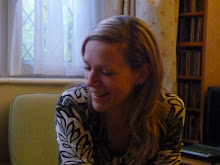
'In a secularised Protestant society such as Britain, the living and the dead are separated not only physically, but also conceptually, with transgressors across the boundary (ghosts, prayers for the dead, appearances of the dead to the bereaved, spiritualist mediums) treated with suspicion’ (Walter, 2004. 472).
As I near the end of this particular stage of this project I have been reflecting on the process of crossing Walter's 'boundary' for research purposes. For those who regularly weave a ‘spirit world’ into their everyday living, it becomes a vital component in the fabric of their social and material worlds. As a researcher, seeking, encountering and interpreting these worlds, I know they cannot be extracted from how we think and theorise about the visible and material worlds we think we know.
-
However, when speaking to an audience of peers - with both feet firmly planted on one side of Walter's boundary - I have found it is not only the transgressors who are treated with suspicion, but also myself for choosing to present them as valid research concerns. And so I have had to tread carefully in terms of how I present what I have found, to whom and in what context.
I am now fully immersed in the process of 'disemmination'. Of course the main 'output' will be the book with Palgrave Macmillan, but under pressure as academics always are to publish widely and present far and wide, I have to find as many different dissemination roots as possible, to make the most of every bit of data and every insight gleened.
-
In this process audiences are of course diverse - I have included some of my research findings in a chapter on living with ME in a book on long term conditions coming out with Sage in the Autumn. The audience here is likely to be students and practitioners wanting to develop insight into caring for and coping with long term conditions, for whom the 'spooky' angle touched upon in my chapter may be pushed aside in favour of concentrating on more concrete matters of the here and now. I have presented at the Vital Signs Conference on 'Engaging Research Imaginations' at Manchester University, here the audience were a receptive mix of social scientists and humanities scholars, unusually open (for academics!) to the idea that for some people spirit lives alongside them in everyday spaces and places. And today I have a piece in the latest issue of The Journal of Paranthropology, the readership of which I should imagine will have no concerns about the legitimacy of crossing Walter's boundary.
-
And then there is my day job. Senior Lecturer in Health and Wellbeing, where I work with practitioners and scholars who stand in high regard in their field and whom I admire considerably. But it is slightly more difficult sometimes amongst them to explain precisely what the place is of transgressing the boundary for those who use spirit connections to enhance their health and wellbeing. This is how a conversation went with one of my colleagues over coffee one morning:
-
Sara: I’m interviewing people about their experiences with angel healing.
Colleague: Angel healing? What’s that?
Sara: It’s where the healer channels energy from angels.
Colleague: But angels don’t exist do they, so how can they heal? That’s just ridiculous! [Nervous but self-righteous laughter]
Colleague: Angel healing? What’s that?
Sara: It’s where the healer channels energy from angels.
Colleague: But angels don’t exist do they, so how can they heal? That’s just ridiculous! [Nervous but self-righteous laughter]
-
Now according to our code of ethics, researchers within The Open University have to: ‘Treat all those associated with their research with respect.’ So how should I have responded to my colleague? I know how she was expecting me to respond. She wanted me to laugh it off with her, to support her own unease and discomfort, and say of course angels don’t exist and it is all nonsense. But how would that be showing my research participants respect?
-
So as I throw myself back over the boundary, and into the very earthly process of dissemination, I find myself grappling with precisely how far, when and with whom, I can push against that invisible divide. For social scientists to be interested in their place in the world, it really doesn't matter whether angels 'exist' or they don't. What matters is the effect that believing in angels can have on a person's world of experience. And that, as I have been finding out, can be immeasurable!
